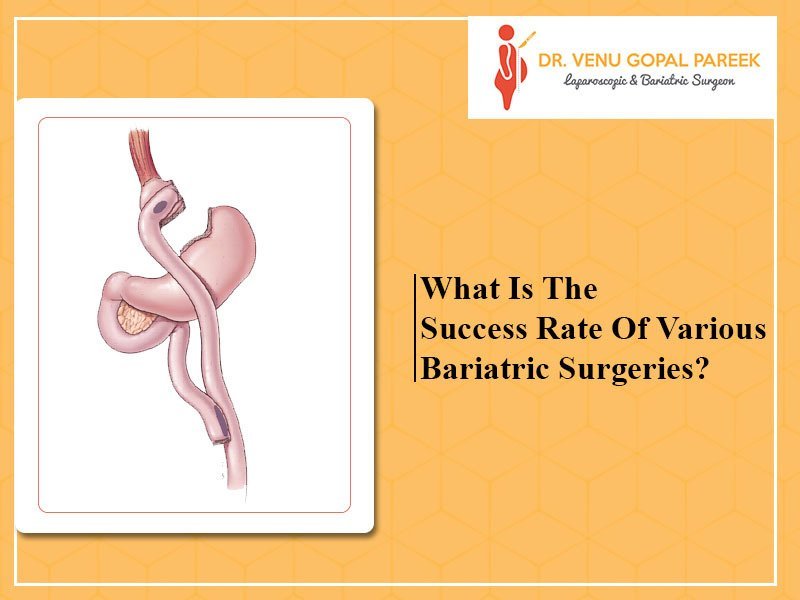
What Is The Success Rate Of Various Bariatric Surgeries?
One of the most frequently asked questions about Bariatric Surgery is the expected success rate. Comparing the success of various procedures can help you decide which is best for you. It is essential to understand what is the success of bariatric procedures measured, and what does success means for your weight loss?
Overweight and obesity is a condition that acts as a breeding ground for various other lifestyle diseases that can ultimately be fatal. Bariatric surgery, also known as weight loss surgery, has been proven to be the most effective treatment for achieving significant weight loss, for those suffering from obesity-related health issues. The surgery changes the stomach’s size, hence reducing the food intake and minimizing the length of the small intestine.
Bariatric surgery helps in weight loss and offers the highest level of improvement of comorbid conditions such as diabetes, hypertension, sleep apnea, arthrosis, dyslipidemia, etc. Hence, it is not surprising that the number of weight-loss surgeries performed has increased in recent years.
So, let us see this article, which gives information about the Different Types of Bariatric Operations.
What is bariatric surgery?

Bariatric surgery is usually referred to as weight loss surgery and is one of the few weight loss treatments that have proven results in the past. The term bariatric surgery refers to any operation performed on the stomach or intestine to cause weight loss.
What Are the Different Types of Bariatric Operations?
Everyone has different needs. We offer bariatric surgery options to help you reduce high-calorie intake. This procedure ranges from slightly invasive to open surgery. Recovery from the surgery and rate of weight loss varies depending on the procedure.
The most common procedure used in India is gastric sleeve surgery (sleeve gastrectomy). Gastric bypass is the second most common bariatric surgery, and lap band surgery is the third most popular procedure in India. The duodenal switch is another beneficial procedure, although it is less common.
How is the success of Bariatric Surgery measured?

The most common measure of success after bariatric surgery is the percentage of excess weight loss. If you see these figures quoted by a weight-loss hospital, check the average of all patients who underwent the procedure. Weight-loss rates are usually given for the first 1-2 years after surgery. Weight loss is usually the fastest during this time, but it will not continue until you continue to watch what you eat.
However, it is essential to remember that these numbers are averages. Therefore, there is no guarantee that you will achieve the same weight loss. You can lose or gain weight, depending on your diet. You also need to assess your success by:
- How well was your surgery and how is the recovery going
- Any improvement in your health, for example, controlled type 2 diabetes
- Do you feel happier and healthier after the procedure
- Are you able to change your lifestyle and maintain long-term weight loss
Most people who undergo bariatric surgery lose a lot of weight and maintain it over the long term. However, about half of patients will regain about 5% of what has been lost. Most are thinner and healthier. About 80% of patients consider surgery successful because they lose weight and feel better in the long run.
How do you calculate weight loss?

The success rate of bariatric surgery is calculated as a percentage of excess weight loss. We can also check your personal weight loss to determine whether the procedure works for you. To do this, we need to know what your ideal weight is.
Your ideal body weight is calculated based on a normal BMI (Body Mass Index) for someone your size. You can do this by multiple smart phone apps as well. This is the weight in kilograms that will give you a healthy BMI of 25.
To determine how much you are overweight, all you have to do is reduce your ideal weight from your current weight. Do this before you start losing weight, so you know how much weight you need to lose. You can then monitor your weight after surgery to track your progress.
The percentage of the excess weight that you lost can be calculated by dividing the amount of weight lost by excess weight and then multiplying it by 100. If you have lost at least 50% of your excess weight at the end of the first year, weight loss surgery will be considered successful on your body.
The success rate for bariatric procedures:

If you are considering bariatric surgery, you might be wondering what you can do to increase your chances of success. One of the most significant decisions you need to take is the type of bariatric procedure. Since each operation affects you differently, the average weight loss is different for each procedure.
In general, successful weight loss operations are sometimes defined as reaching 50 per cent or more weight loss and maintaining that level for at least five years. Clinical data varies for each different procedure listed. You can expect to lose the following average proportion of overweight in the first two years:
- The gastric band causes weight loss around 40 – 50%
- 50-60% weight loss is achieved after sleeve gastrectomy. It induces rapid and significant weight loss, which results in a comparative study similar to the Roux-en-Y gastric bypass.
- 60-80% weight loss is achieved after gastric bypass. It produces significant long-term weight loss.
- In Biliopancreatic Diversion with Duodenal Switch (BPD/DS), Gastric Bypass results in a significant weight loss compared to RYGB, LSG, or AGB, i.e., 60-70% weight loss or more, with five years of follow-up.
Clinical studies show that most patients lose weight quickly after surgery, and do so for up to 18 to 24 months after the procedure. Patients can lose 30 to 50 per cent of their excess weight in the first six months and 77 per cent of their excess weight in the first 12 months after surgery.
Other studies show that patients can maintain 50 to 60 per cent weight loss 10 to 14 years after surgery. Patients with a higher initial BMI tend to lose total weight. Patients with lower initial BMI lose a higher percentage of their excess body weight and are closer to their ideal body weight (IBW). Patients with type 2 diabetes tend to have less overall weight loss.
What influences the level of success?

Factors that can influence your weight loss:-
- How well you go on a diet after this procedure has a significant impact on success. If you follow your doctor’s recommendations, you must lose weight quickly in the first six months.
- How much physical activity you do also affects weight loss. You should gradually increase the amount of exercise you do following your doctor’s instructions to improve your health and lose more weight.
- Individual differences can also affect weight loss because everyone reacts differently. It is impossible to predict these differences.
Effectiveness of bariatric operations:
- The actual weight loss after the procedure depends on several factors.
- Age
- Weight before surgery
- General health conditions
- Special Operations
- The ability to exercise
- Obligation to comply with nutrition guidelines and other aftercare
- Motivation and cooperation between family, friends, and employees
Management of obesity with bariatric surgery:

It is essential to understand that surgery is only a tool that can help you achieve permanent weight loss and improve comorbidity. Surgery only plays a small role in the treatment of obesity. After this operation, you must commit to changing your diet and exercise.
Conclusion:
Bariatric surgery is a life-changing process. Surgery is a tool that helps you lose weight. After losing weight, it is up to you to apply continued lifestyle changes. With weight loss, exercise becomes more comfortable. The knowledge you gain during meals will be precious. Friends you find in support groups, and professional teams in your bariatric program are significant.
Which method is best for you? Whatever you choose! This is not the type of surgery you have, but your ability to follow directions and implement sustainable lifestyle changes. All approved bariatric operations work. For more information about what type of bariatric surgery is best for you, contact Dr Venu Gopal Pareek at 091777 77715 consultant Bariatric surgeon at Sunshine Hospital.





